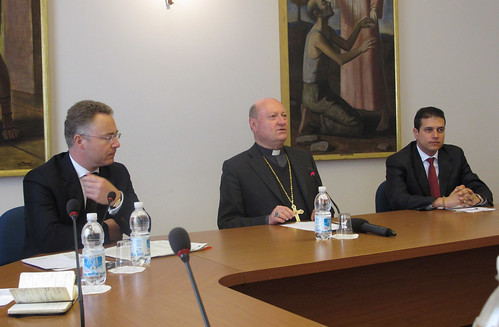27th May 2013
Well-being, the Common Good and the Holy See

What are governments for? At its most fundamental, the role of government is to keep people and communities safe. Right until the modern era, provision of security was seen as the prime function of government. It still is an essential priority, and it is no coincidence that assuring national security remains one of the over-riding foreign policy objectives of the British government. The other is increasing national prosperity. And thereby lies the question. How do we measure, and therefore promote, prosperity? Is a successful country one that has strong GDP growth? Or are there other factors to our well-being?
Alongside the Embassy of Costa Rica and the Pontifical Council for Culture, my embassy is bringing this debate to Rome on 28 May. My government has for some time accepted what the OECD describes as the need for “better policies for better lives” – that to “really improve lives”, in the words of David Cameron, GDP growth alone is not sufficient. The Catholic Church and the Holy See has long been aware of this. Pope John XXIII defined the purpose of authority as the service of “the common good”, its key conditions being freedom, truth, justice and solidarity in society. But how can governments know they are on the right path towards serving the common good?
The well-being debate has engaged thinkers from Amartya Sen to Josef Stiglitz. In 2010, the British government established a Measuring National Well-being development programme at the Office of National Statistics, seeking to gauge how well-being at a national level could be promoted through government policies. It established key indicators beyond economic growth: relationships, health, what we do, where we live, personal finance, education, the natural environment, governance, and even subjective well-being – am I satisfied with life, or not, and why? – to underpin its analysis. Its report in November 2012 – Life in the UK – was the first time well-being had been mapped in Britain.
Will measuring well-being change government policies and help improve lives, as independent think tanks like the New Economics Foundation or our own national Well-Being programme imply? The jury is still out. I would like to think that better policies built around well-being bring our ability to serve the common good a little closer. I hope our 28 May conference will be a useful contribution to the international political, intellectual, cultural, economic and religious debate underway.
I hope your next blog covers the results of the conference. The contrast between England and Costa Rica should be interesting.
Financial insecurity and general lack of “welfare” is one of the chief drivers of dishonesty, violence and corruption in Third World countries. Those familiar with both the England of Dickens and Third World countries of today are aware of the similarities. Oliver Twist is forever present, and Bleak House is not something in the past. Theft on petty (and not so petty) levels as well as corruption in the judicial sphere and in government offices is rampant and generalized; so is violence, organized crime and drug trafficking (witness Colombia, Venezuela, Peru and Central America with some of the lowest incomes and highest murder rates in the world). What reaches the news is the tip of the iceberg.
Welfare has one fundamental advantage: it took away the edge of economic anxiety and thus, much of the motivation for dishonesty and violence and corruption. And labour unions made us aware (and ashamed) of the workers plight. England’s generalized middle class morality (vis a vis the lack of economic not to mention tax morality of Third World purportedly Catholic countries) may not be due not so much to Victoria’s Christian England as to social security. Its disadvantage lies in having de-motivated private business initiative.
Measuring wellbeing alone may solve isolated instances of wellness but it will not solve the general economic crisis or matters pertaining to wellbeing that are simply beyond government competence.
What should be dealt with are the limits to social security, irresponsible long terms indebtedness, current government spending, and restrictions on politicians election promises…because social security and welfare aside, we have to live within our means: the welfare of today’s population cannot be bought at the cost of the welfare of the population of tomorrow.